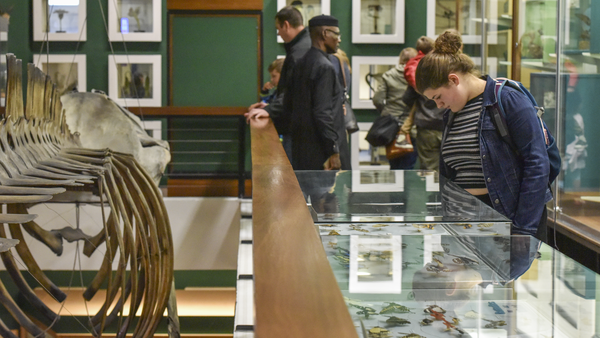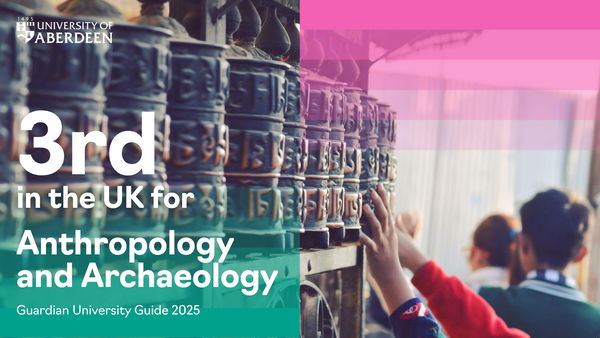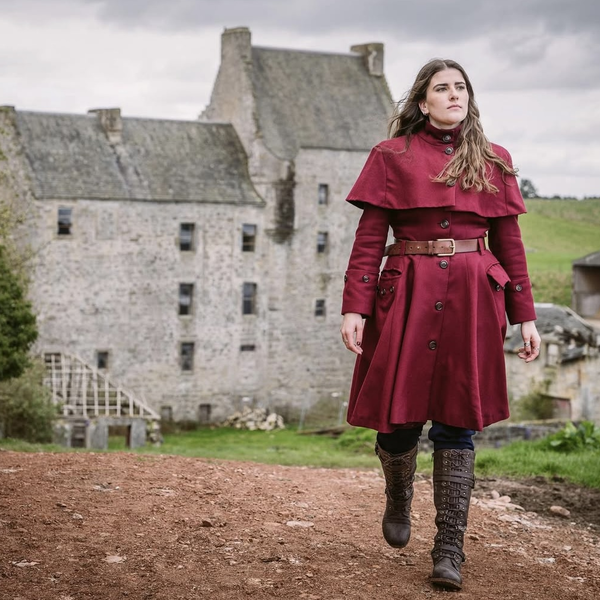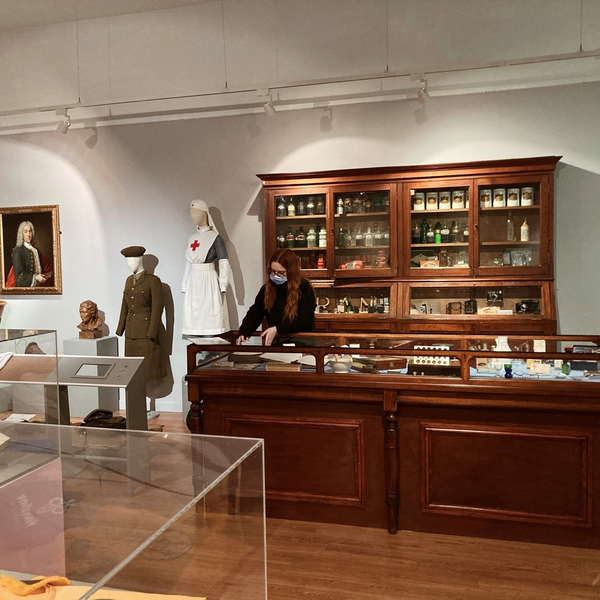
Introduction
The one-year Museum Studies master's programme draws on the University’s extensive museum collections to enable you to explore critical approaches to museum theory while also studying the application of museum practice and research at first hand.
This course has both January and September start dates. Apply Now
Explore the latest digital exhibition curated by MLitt Museum Studies Students: "Toxic Relationships: The Dose Makes the Poison"
Did you know? Aberdeen is ranked 3rd in the UK for Anthropology and Archaeology* and 1st in Scotland for Overall Satisfaction in Anthropology** (*Guardian University Guide 2025, **National Student Survey 2024)
Study Information
Study Options
- Learning Mode
- On Campus Learning
- Degree Qualification
- MLitt
- Duration
- 12 months or 24 months
- Study Mode
- Full Time or Part Time
- Start Month
- September or January
- Location of Study
- Aberdeen
The University of Aberdeen is one of the very few UK universities to have international-quality museum collections relating to the natural and cultural worlds. Our collections are among the oldest, largest and most significant in the country.
The Museum Studies programme makes significant use of these collections to enable you to study the historical and contemporary roles of museums in society and develop skills in public engagement with research while gaining practical experience of museum work.
You will gain foundational curatorial skills and an appreciation of contemporary issues museums face. With a range of optional courses available to supplement our core courses that address museum professional practice, career planning, and collections-based research skills, you can customise your degree to specific areas of interest. Optional courses include Museums and the Digital World, which involves designing a digital intervention for the University Collections, and Decolonising Museums, which tackles one of the most pressing issues facing the sector today.
Alongside developing an understanding of museum theory, you will hone the practical skills utilised in the heritage sector including curation practice, grant application writing, and interpreting academic and specialist knowledge for the wider public. During the summer three options are normally available: ‘Curating an Exhibition’ involves working with museum staff to design an online exhibition using the University’s collections with associated display cases around campus. You may prefer to research a topic in depth through writing a Museum Studies dissertation, a route recommended for those aiming to continue to the PhD in Museum Studies. There are many opportunities to work directly with the collections if this route appeals. Finally, the Museum Studies Placement option allows students to put their skills into practice by carrying out a project with a partner museum.
Available Programmes of Study
- MLitt
-
Museum Studies
Qualification Duration Learning Mode Study Mode Start Month LocationMLitt 12 months or 24 months On Campus Learning Full Time or Part Time September Aberdeen MoreMLitt 12 months On Campus Learning Full Time January Aberdeen MoreProgramme Fees
Fee information Fee category Cost EU / International students £23,000 Tuition Fees for 2025/26 Academic Year UK £11,100 Tuition Fees for 2025/26 Academic Year Graduates of the University of Aberdeen are eligible for the Alumni Postgraduate Scholarship, which reduces the tuition fee to £7,000, in line with the current tuition fee loan amount offered by the Student Awards Agency Scotland (SAAS). Please see the following for full terms and conditions: https://www.abdn.ac.uk/study/funding/653 Stage 1
Compulsory Courses
- Getting Started at the University of Aberdeen (PD5506)
-
This course, which is prescribed for all taught postgraduate students, is studied entirely online, is studied entirely online, takes approximately 2-3 hours to complete and can be taken in one sitting, or spread across the first 4 weeks of term.
Topics include University orientation overview, equality & diversity, MySkills, health, safety and cyber security, and academic integrity.
Successful completion of this course will be recorded on your Transcript as ‘Achieved’.
- The Museum Idea (AT5526)
-
30 Credit Points
Why do human beings collect and what is the purpose of museums? ‘The Museum Idea’ examines these questions by focusing on the history and philosophy of museums and relating these to contemporary museum practice. The course will examine the role of museums in society through case studies of exhibitions and other museum projects in a variety of settings, including art, history and ethnographic museums.
- Museum Professional Practice (AT5556)
-
30 Credit Points
"Museum Professional Practice" examines some of the key issues facing museums today and how they are responding. The course will consider critically professional practices of collections management, care and documentation, examining the social, political and ethical issues within which they operate. The course is taught by a team of academic and professional staff, making use of the University's museums, including exhibitions, collections and conservation facilities and activities.
Stage 2
Optional Courses
Normally, students will take 60 credits in Stage 2 from the following electives (some courses may not be available in every year, others may be made available):
- Curating an Exhibition (AT5912)
-
60 Credit Points
The ‘Curating an Exhibition’ course leads to the creation and opening of an exhibition for the University’s museums. Working together as a team, each student also takes on a specific role, including research, writing, design, installation, marketing, working closely with professional members of museum staff. The course makes extensive use of the University’s internationally-important museum collections and gives students an opportunity to reflect on an important aspect of museum practice. The exhibition will include an in-person exhibition in high-profile display cases in the Sir Duncan Rice Library café and an online exhibition. The course is assed by a personal reflective portfolio.
- Museum Studies Dissertation (AT5908)
-
60 Credit Points
This course builds on the skills and knowledge acquired in taught courses in the MLitt Museums Studies programme. In completing their dissertation, students will be expected to demonstrate that they can conduct advanced library research, prepare an extensive literature reviews situating their research question in its wider academic and professional context, and write and edit a large piece of work. In addition, they will be required to prepare abstracts and bibliographies and assess the ethical issues involved in original research. All students will receive staff supervision in identifying a suitable topic and in completing an original research project.
- Museum Studies Placement (AT5913)
-
60 Credit Points
As a practice-based alternative to a dissertation, students take part in a 20 day placement in a museum or gallery followed by writing an 8,000 word Museum Studies Project. Some students opt for a four-week placement in the early summer, while others choose to make a regular arrangement to volunteer in a local museum during term-time. Placements are offered in a range of museums in Scotland, but students can also identify other possibilities themselves.
Stage 3
Compulsory Courses
- Researching Museum Collections (AT5043)
-
15 Credit Points
Research and interpreting artefacts is core to many aspects of museum work. This course gives students experience of working directly with the collections of the University Museums. By preparing an in-depth study of one artefact, students will develop skills in close observation of artefacts and of sourcing archival and secondary information. They will also learn how to apply current approaches to working with material culture, drawn from anthropology, history and museum studies, to museum collections.
- Museum Pathways (AT5055)
-
15 Credit Points
Museum Pathways prepares students for museum employment, involving input from a variety of practitioners at different career stages and in different areas within the museum sector. They will complete a two part assignment, totalling 3000 words, on their chosen role and CPD plan.
Optional Courses
In addition, students will normally take a further 30 credit points from the following electives (some courses may not be available in every year, others may be made available):
- Museums and the Digital World (AT5050)
-
30 Credit Points
Given the expanding use of the Internet and new media forms, museums are re-evaluating their relationships with their audiences as well as their relationships with collections. This course introduces students to a wide range of digital technologies as they relate to museums e.g., online exhibitions, smart phone apps, and 3D imagery. Students will examine the impact and consequences of using digital approaches, and the implications for museums and their users of these rapidly changing technologies.
- Decolonising Museums (AT5053)
-
30 Credit Points
Museums worldwide are grappling with the complex legacies of colonialism that have shaped collections, institutional practices, and museum relationships with their users. This course introduces students to current debates regarding how - and if - the museum can fully decolonise. It also gives them a grounding in the historical, social, and institutional contexts which have led to these debates, and introduces practice-based strategies to address one of the key challenges facing museums and heritage institutions today.
Programme Fees
Fee information Fee category Cost EU / International students £23,000 Tuition Fees for 2025/26 Academic Year UK £11,100 Tuition Fees for 2025/26 Academic Year Graduates of the University of Aberdeen are eligible for the Alumni Postgraduate Scholarship, which reduces the tuition fee to £7,000, in line with the current tuition fee loan amount offered by the Student Awards Agency Scotland (SAAS). Please see the following for full terms and conditions: https://www.abdn.ac.uk/study/funding/653
We will endeavour to make all course options available. However, these may be subject to change - see our Student Terms and Conditions page.
Fee Information
Additional Fee Information
- Fees for individual programmes can be viewed in the Programmes section above.
- In exceptional circumstances there may be additional fees associated with specialist courses, for example field trips. Any additional fees for a course can be found in our Catalogue of Courses.
- For more information about tuition fees for this programme, including payment plans and our refund policy, please visit our Tuition Fees page.
Scholarships
All eligible self-funded international Postgraduate Masters students starting in September 2025 will receive an £8,000 scholarship. Learn more about this Aberdeen Global Scholarship here.
To see our full range of scholarships, visit our Funding Database.
How You'll Study
An important feature of the Museum Studies programme is its extensive use of the University’s museums and collections and involvement of both academic staff in a range of related disciplines such as Anthropology, Archaeology, Education and Art History and the professional staff of the University’s museums.
Teaching of the Museum Studies courses is in small groups, with one-to one supervision for the final project.
Learning Methods
- Field Trips
- Individual Projects
- Lectures
- Research
- Seminars
- Workshops
Assessment Methods
Assessments will combine practical skills and academic writing. These include developing a career portfolio, report writing, drafting mock grant applications, writing for a public audience etc. All the assignments are designed to provide students with experience of the kind of writing required for a career in the heritage sector.
Why Study Museum Studies?
- Study at a nationally and internationally renowned university for Anthropology. The University of Aberdeen is ranked 3rd in the UK for Anthropology and Archaeology (Guardian University Guide 2025), 4th in the UK for Anthropology (The Times and Sunday Times Good University Guide 2025) and in the Global Top 100 for Anthropology (QS World University Rankings by Subject 2024)
- Aberdeen is ranked 1st in Scotland for Overall Satisfaction in Anthropology (National Student Survey 2024)
- The MLitt Museum Studies is aimed at graduates in anthropology, archaeology, history and art history, and cultural and communication studies, but also attracts students from other disciplines who wish to develop expertise in public engagement with research and the cultural and heritage sectors
- This programme combines learning about theoretical issues with developing professional expertise. You will apply your intellectual skills to live museum situations, providing you with a portfolio of experience along with your MLitt Museum Studies when you graduate
- You will learn from practising museum professionals and academic specialists from Museum Studies, Anthropology, and Education. Guest lectures may be given by staff from disciplines including Archaeology, Law, Philosophy, and Art History, and from external colleagues based in a wide range of national and international museums
- Enhance your learning with guest lectures by staff from disciplines including Archaeology, Law, Philosophy, Art History, Visual Culture and History, and the Museums and Special Collections evening lecture programme
- Volunteering opportunities are often available for students wanting to engage with the University Collections
- The University’s extensive museum collections consist of European and Mediterranean Archaeology, Fine Art, Non-Western Archaeology and Ethnography, Numismatics, Scientific Instruments, Scottish History & Archaeology, Anatomy, Pathology and Forensic Medicine, Geology, Herbarium and Zoology
Entry Requirements
Qualifications
The information below is provided as a guide only and does not guarantee entry to the University of Aberdeen.
Applicants for admission will normally be expected to hold a relevant Honours degree with a 2:1 standard from a recognised university or body in a relevant discipline, such as, but not limited to, anthropology, history, art history, media studies, cultural studies, digital heritage, archaeology, geography, environmental sciences, biology, ecology or science communication.
Applicants without this qualification may be admitted subject to having an alternative qualification, or an approved level of work experience appropriate to the field of study. Also taken into careful consideration is the trajectory of results, an applicant without an overall 2.1 but with 2.1 results in their final two years of study may be admitted.
Please enter your country or territory to view relevant entry requirements.
English Language Requirements
To study for a Postgraduate Taught degree at the University of Aberdeen it is essential that you can speak, understand, read, and write English fluently. The minimum requirements for this degree are as follows:
IELTS Academic:
OVERALL - 6.5 with: Listening - 5.5; Reading - 6.0; Speaking - 5.5; Writing - 6.0
TOEFL iBT:
OVERALL - 90 with: Listening - 17; Reading - 21; Speaking - 20; Writing - 21
PTE Academic:
OVERALL - 62 with: Listening - 59; Reading - 59; Speaking - 59; Writing - 59
Cambridge English B2 First, C1 Advanced or C2 Proficiency:
OVERALL - 176 with: Listening - 162; Reading - 169; Speaking - 162; Writing - 169
Read more about specific English Language requirements here.
Document Requirements
You will be required to supply the following documentation with your application as proof you meet the entry requirements of this degree programme. If you have not yet completed your current programme of study, then you can still apply and you can provide your Degree Certificate at a later date.
- Degree Certificate
- a degree certificate showing your qualifications
- Degree Transcript
- a full transcript showing all the subjects you studied and the marks you have achieved in your degree(s) (original & official English translation)
- Personal Statement
- a detailed personal statement explaining your motivation for this particular programme
- Reference x 2
- two reference letters, one of which should be from your university discussing your academic ability. If you have been out of education for a long time you may wish to use your current or most recent employers, or other professional individuals
Aberdeen Global Scholarship
Eligible self-funded Postgraduate Taught (PGT) students will receive the Aberdeen Global Scholarship. Eligibility details and further information are available on our dedicated page.
Aberdeen Global ScholarshipCareers
This degree provides suitable preparation for working in museums, galleries and heritage institutions, for those who wish to conduct further research in Museum Studies, and for an academic role in a variety of associated fields. It is also a valuable degree for those who are interested in developing ways of communicating academic work to the public.
The programme is geared towards both vocational study for work in the sector, and those wishing to pursue an academic career. It offers students the opportunity to engage in a number of transferable skills, such as project management, teamwork and research which are required across a broad range of roles and sectors.
Graduates of this programme have gone on to work at institutions including the British Museum, the Royal Collection Trust, the National Trust, Juneau Douglas City Museum, and the Gordon Highlanders Museum. Career prospects include work in collections management, curation, exhibition development, programme management, museum research, and more.
Career Opportunities
- Collections Manager
- Curator
- Exhibition Development
- Lecturer
- Museum Officer
- Museum Researcher
- Programme Manager
- Public Engagement
What our Alumni Say
Our Experts
Information About Staff Changes
You will be taught by a range of experts including professors, lecturers, teaching fellows and postgraduate tutors. However, these may be subject to change - see our Student Terms and Conditions page.
Facilities
As well as academic facilities, you will work within the University’s museums, including:
- Zoology Museum (worldwide in scope, from protozoa to the great whales, including taxidermy, skeletal material, study skins, fluid-preserved specimens and models.
- Museums Collections Centre (the location of most of the human culture collections).

Sir Duncan Rice Library
The University’s award winning Sir Duncan Rice Library is listed in the “Top 20 spellbinding University libraries in the World”. It contains over a million volumes, more than 300,000 e-books and 21,000 journals.
Find out more
Zoology Museum
The museum’s displays are worldwide in scope, from protozoa to the great whales, including taxidermy, skeletal material, study skins, fluid-preserved specimens and models.

The University Collections at the University of Aberdeen
The University's museum collections were founded in 1751, contain over 300,000 objects, and have been deemed Recognised Collections of National Significance by the Scottish Government.
Find out moreGet in Touch
Contact Details
- Address
-
Student Recruitment & Admissions
University of Aberdeen
University Office
Regent Walk
Aberdeen
AB24 3FX











